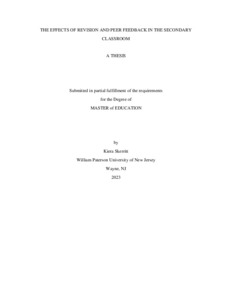Please use this identifier to cite or link to this item:
http://hdl.handle.net/20.500.12164/3459Full metadata record
| DC Field | Value | Language |
|---|---|---|
| dc.contributor.author | Skerritt, Kiera Leigh | - |
| dc.date.accessioned | 2024-08-22T16:25:54Z | - |
| dc.date.available | 2024-08-22T16:25:54Z | - |
| dc.date.issued | 2024-08-13 | - |
| dc.identifier.uri | http://hdl.handle.net/20.500.12164/3459 | - |
| dc.description.abstract | There is a demand for proficient writing, yet many students are struggling with writing. The National Assessment of Educational Progress (NAEP), which conducts a writing assessment to measure important skills that students obtain over the course of their K-12 learning experience, issued results from the 2011 test that state that only about 27% of students are performing at or above proficient level at both grades (grades 8 and 12). The results convey the need for practices such as revision and peer feedback that would promote the kind of thinking that would ultimately improve student writing. This problem led to the development of the following research questions: (1) After engaging in the practice of revision, what is the change in the quality of student writing? (2)How do students apply peer feedback? An English teacher analyzed students’ writing after engaging in revision and writing that was completed during an on-demand time session. In addition, the teacher analyzed how students applied the feedback they received from their peers. The study utilized data that was conducted over two week period and during an 80-minute timed class session in an eleventh grade classroom. The participants 15 eleventh graders who were randomly selected. The following data sources were used: students’ revised writing, on-demand, writing, multigenre rubric for scoring writing, and a peer feedback form. The study concluded that the quality of student writing improves after engaging in revision; tone of feedback influences effectiveness; only understood feedback can be applied; metacognitive skills assist in the application of feedback; and peer reviewers must be more specific with suggestions. It is recommended that teachers focus more on metacognitive strategies in the classroom. | en_US |
| dc.format.extent | 64 pages | en_US |
| dc.language.iso | en_US | en_US |
| dc.publisher | William Paterson University | en_US |
| dc.subject | Education | en_US |
| dc.subject | Creative writing | en_US |
| dc.subject | Metacognition | en_US |
| dc.subject | Peer feedback | en_US |
| dc.subject | Quality of writing | en_US |
| dc.subject | Revision | en_US |
| dc.subject | Tone of feedback | en_US |
| dc.subject | Writing | en_US |
| dc.subject.lcsh | Education | en_US |
| dc.title | The Effects of Revision and Peer Feedback in the Secondary Classroom | en_US |
| dc.type | Thesis | en_US |
| Appears in Collections: | Theses & Dissertations | |
Files in This Item:
| File | Description | Size | Format | |
|---|---|---|---|---|
| Skerritt_ClassroomPeerFeedback.pdf | 775.04 kB | Adobe PDF |  View/Open |
Items in DSpace are protected by copyright, with all rights reserved, unless otherwise indicated.
